Many prospective dog owners dream of a furry companion that brings joy without the hassle of excessive shedding or high-strung energy. If you’re searching for small dogs that don’t shed and are calm, you’re looking for a delightful addition to your family. These breeds are often a perfect fit for apartment dwellers, allergy sufferers, or anyone seeking a peaceful, low-maintenance canine friend. Beyond just shedding, a calm temperament ensures a harmonious home environment, making daily life with your pet a truly serene experience. Let’s explore some of the best small breeds that offer both minimal hair and maximum tranquility.
Choosing the right dog involves balancing many factors, from grooming needs to personality traits. For those prioritizing a clean home and a relaxed atmosphere, a small quiet dog breed that doesn’t shed is often at the top of the list. These dogs tend to integrate seamlessly into various lifestyles, providing gentle companionship without constant demands. Their manageable size and docile nature make them ideal companions for seniors, families with older children, or individuals living in smaller spaces. Understanding their specific characteristics is key to finding your perfect match.
Understanding the Benefits of Calm, Non-Shedding Small Dogs
The appeal of small dogs that don’t shed and are calm extends far beyond mere aesthetics. These breeds offer a unique blend of advantages that cater to specific preferences and living situations:
- Allergy-Friendly: One of the most significant benefits is their hypoallergenic nature. While no dog is 100% hypoallergenic, breeds with hair (rather than fur) or minimal shedding typically produce less dander, the primary allergen. This makes them an excellent choice for individuals with allergies. If you’re looking for a companion that won’t trigger sneezes or itchy eyes, exploring options for small hypoallergenic dog breeds that don t shed is a smart first step.
- Cleaner Homes: Less shedding means less dog hair on your furniture, floors, and clothes. This significantly reduces the amount of cleaning required to maintain a tidy living space, allowing you more time to enjoy with your pet rather than constantly vacuuming.
- Peaceful Companionship: Calm temperaments are invaluable, especially in busy households or smaller living environments. These dogs are generally more content to relax by your side, less prone to excessive barking, and often adapt well to routines, contributing to a more tranquil home atmosphere.
- Ideal for Apartment Living: Their small size combined with a calm demeanor makes them perfectly suited for apartment life. They typically require less space and can often meet their exercise needs with indoor play and short daily walks, reducing the stress on both the dog and the owner in urban settings.
Key Considerations Before Choosing a Breed
While the allure of a calm, non-shedding small dog is strong, it’s crucial to consider other aspects to ensure a happy, healthy relationship.
- Grooming Needs: “Non-shedding” doesn’t mean “no maintenance.” Many non-shedding breeds have continuously growing hair that requires regular brushing, professional grooming, and occasional baths to prevent matting and maintain skin health. Factor in the time and cost associated with these grooming requirements.
- Exercise Requirements: Even calm dogs need exercise. While their needs might be moderate, daily walks and playtime are essential for their physical and mental well-being. Understand the specific energy levels of each breed.
- Temperament & Training: While generally calm, individual personalities vary. Early socialization and consistent positive reinforcement training are vital for any dog to develop good manners and adapt to your home. Research breed-specific temperament traits.
- Health & Lifespan: Like all breeds, these dogs can be prone to certain health conditions. Responsible breeders will provide health clearances. Be prepared for regular vet check-ups and a commitment to their long-term health.
Now, let’s dive into specific small dog breeds that beautifully combine a calm nature with minimal shedding.
Affenpinscher
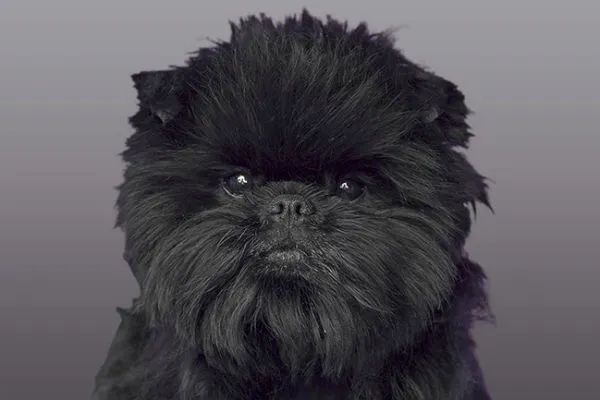 Affenpinscher dog sitting attentively with a slightly scruffy dark coat and expressive eyes
Affenpinscher dog sitting attentively with a slightly scruffy dark coat and expressive eyes
The Affenpinscher, whose name translates to “monkey-like terrier,” lives up to its playful moniker both in appearance and intelligence. Despite their small stature, these Toy breed dogs are surprisingly fearless and make excellent watchdogs, alerting you to any unannounced guests. What makes them particularly appealing for those seeking a small dog that doesn’t shed much and is calm indoors is their wiry coat, which sheds very little and has almost no “doggy” odor. They are known for their sense of humor and affectionate nature with their families, often content to observe and be close by. A twice-weekly brushing with a slicker brush and comb is typically all that’s needed to keep their shaggy-yet-neat look, making them a relatively low-maintenance option for grooming.
Basenji
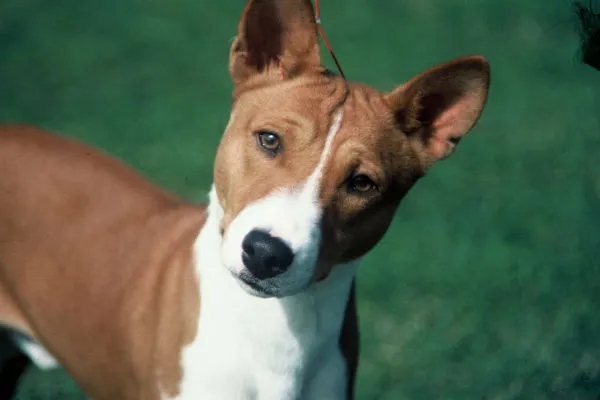 Alert Basenji dog with a short, smooth reddish-brown coat and distinctive curled tail
Alert Basenji dog with a short, smooth reddish-brown coat and distinctive curled tail
For individuals who appreciate the elegance of hounds but wish to avoid their characteristic odor and shedding, the Basenji presents a compelling alternative. This unique breed sheds very minimally, and its short, fine coat is incredibly easy to care for, requiring little more than an occasional brushing to keep it pristine. Basenjis are famously quiet dogs, known for their inability to bark (they make a yodel-like sound instead). This trait, combined with their minimal shedding, makes them an ideal calm small dog breed for apartments, provided they receive daily exercise and engaging playtime to satisfy their energetic spirit. They are intelligent, independent, and form strong bonds with their human companions.
Bichon Frise
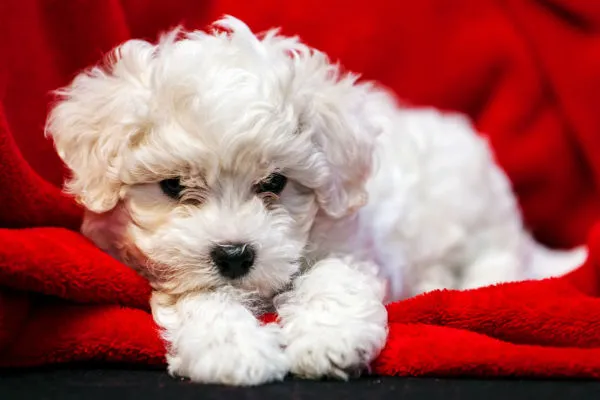 Fluffy white Bichon Frise dog with dark, round eyes looking inquisitively
Fluffy white Bichon Frise dog with dark, round eyes looking inquisitively
The Bichon Frise is a quintessential non-shedding small dog breed, making them a dream come true for allergy sufferers. These playful and affectionate dogs are well-known for their cheerful dispositions and their characteristic powder-puff appearance. While they don’t shed, their continuously growing hair demands frequent grooming, brushing, and regular baths to prevent matting and maintain their iconic fluffy look. Despite the grooming commitment, their gentle, loving nature and relatively calm demeanor indoors make them an ideal family dog that doesn’t shed, bringing a ray of sunshine into any home. They thrive on companionship and are generally eager to please, making them good candidates for training.
Bolognese
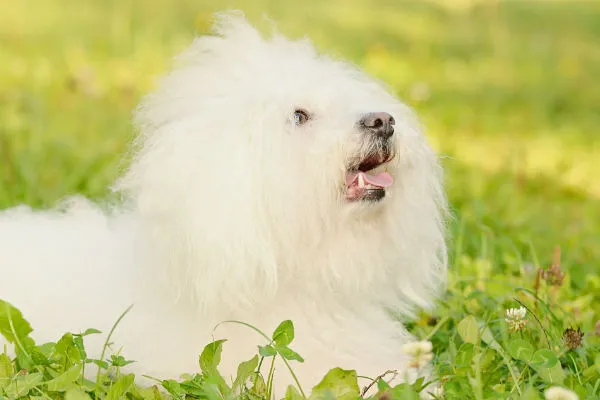 Calm Bolognese dog with a soft, curly white coat and dark eyes
Calm Bolognese dog with a soft, curly white coat and dark eyes
Much like their cousin, the Bichon Frise, the Bolognese possesses a distinctive fluffy coat composed of hair rather than fur. This means the Bolognese does not shed, offering a significant advantage for those concerned about loose dog hair. However, regular brushing is essential to remove dead hair and prevent matting, ensuring these lovable lap dogs always look their best. Bolognese dogs are known for their calm, devoted, and somewhat shy nature, making them excellent companions for quieter households or individuals seeking a gentle presence. They thrive on human companionship and are typically content with moderate indoor activity and short daily walks, fulfilling the criteria for calm small dogs that don’t shed.
Brussels Griffon
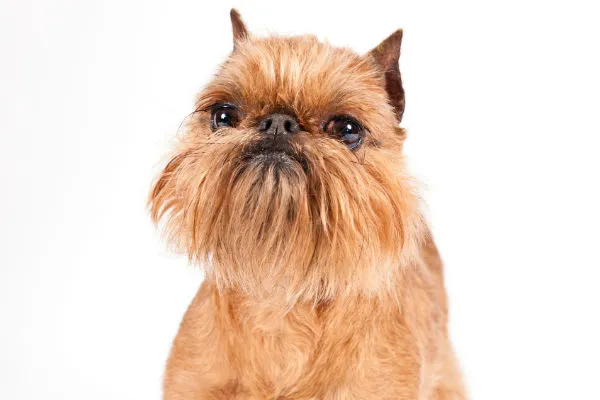 Small, rough-coated Brussels Griffon dog with an alert expression and prominent beard
Small, rough-coated Brussels Griffon dog with an alert expression and prominent beard
Despite their diminutive size, Brussels Griffons are not dogs that demand excessive pampering. Available in both smooth-coated and rough-coated varieties, both types are minimal shedders, with the rough-coated variety needing regular hand-stripping or trimming to maintain its texture. These loyal little dogs are often described as sensitive and charming, thriving best with families who are frequently home, as they cherish companionship. Their small size means that a daily walk combined with indoor play is usually sufficient to meet their exercise needs, making them a suitable small quiet dog breed for various living situations. While they can be playful, they are also known for their affectionate lap-dog tendencies, making them excellent candidates for those seeking Small Dogs That Dont Shed And Are Calm.
Chinese Crested
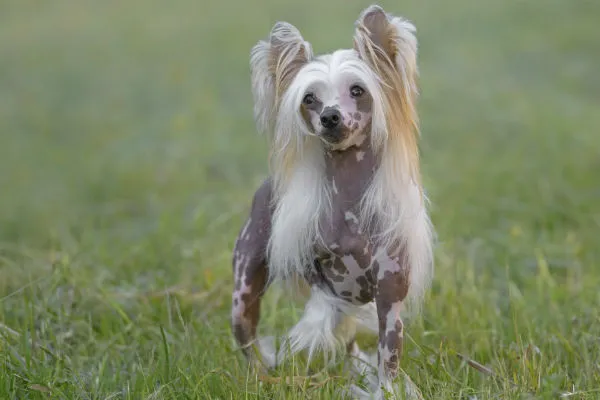 Elegant Hairless Chinese Crested dog with tufts of hair on its head, tail, and paws
Elegant Hairless Chinese Crested dog with tufts of hair on its head, tail, and paws
For those prioritizing zero shedding, the hairless variety of the Chinese Crested offers a unique solution. This breed comes in two distinct coat types: hairless and powderpuff. The hairless Chinese Crested has tufts of hair on its head, tail, and feet, while the powderpuff is covered with a fine, soft coat that sheds very minimally. The hairless variety naturally avoids shedding, and the powderpuff is also a great option for those seeking a low-shedding small dog. Hairless dogs do require specialized skin care, including protection from sun and cold, and are more prone to skin irritations. Temperament-wise, Chinese Cresteds are often described as playful, affectionate, and devoted to their families, enjoying quiet time just as much as active play, especially indoors. This makes them a wonderfully calm choice for attentive owners.
Coton De Tulear
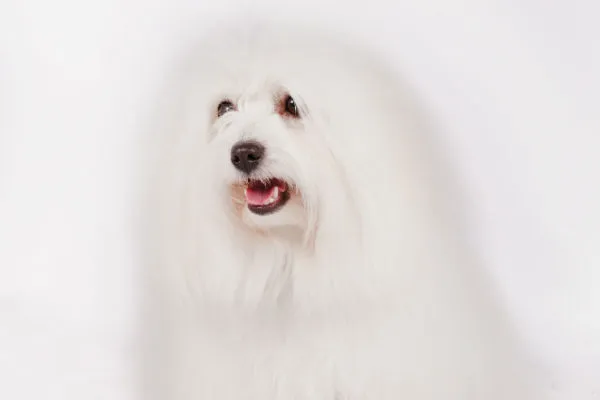 Coton de Tulear dog with a long, fluffy white coat looking sweetly at the camera
Coton de Tulear dog with a long, fluffy white coat looking sweetly at the camera
The Coton de Tulear is celebrated for its distinctive long, fluffy coat, which is widely considered hypoallergenic, making it an excellent choice for allergy sufferers and anyone seeking a small dog that doesn’t shed. Their lighthearted and gentle natures make the effort of daily grooming – which is necessary to prevent mats – incredibly worthwhile. Cotons are known for their cheerful disposition and adapt well to various living situations, making them fantastic companions. They thrive on human interaction and are generally very calm and intelligent, enjoying quiet time with their owners as much as a playful romp. Their affectionate and docile temperament solidifies their position as one of the top calm, non-shedding small dog breeds suitable for many homes.
Havanese
 Playful Havanese dog with long, silky dark and white fur, looking cheerful
Playful Havanese dog with long, silky dark and white fur, looking cheerful
These charming native Cuban dogs offer a delightful combination of spunky charm and a non-shedding coat, translating to less time spent lint rolling furniture and more quality time romping with your playful companion. The Havanese coat does require weekly brushing and regular baths to keep it clean and healthy, but their minimal shedding makes them a favored choice for many. Renowned for their outgoing and gentle nature, Havanese dogs are eager to please and easily trained. They are intelligent and adapt well to different environments, making them suitable for apartment living. Their affectionate and often comical personality, combined with their manageable energy levels, places them firmly among the small family dogs that don’t shed and are calm, bringing joy and warmth to any household.
Maltese
 Elegant Maltese dog with long, flowing white hair and a dark nose, looking regal
Elegant Maltese dog with long, flowing white hair and a dark nose, looking regal
Maltese dogs have captivated human hearts for three millennia, a testament to their enduring appeal. This ancient breed from Malta has changed little over the centuries, perhaps due in part to their long, flowing white coats that shed very little, making them an ideal lap dog and perfect for those desiring different types of small dogs that don’t shed. While their coats are low-shedding, they do require regular brushing to prevent mats and occasional baths to keep their silky hair pristine. Maltese are known for their gentle, sweet, and playful demeanor. They thrive on companionship and are typically calm and content to be by their owner’s side, making them wonderful companions for individuals or families seeking a serene and affectionate presence.
Lhasa Apso
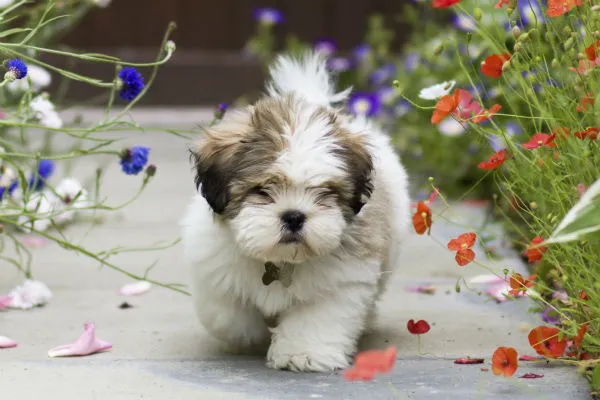 Lhasa Apso dog with long, thick golden-colored fur and a wise expression
Lhasa Apso dog with long, thick golden-colored fur and a wise expression
Originating from Tibet, the Lhasa Apso is an excellent companion known for its blend of calm dignity and playful spirit. These small dogs enjoy brisk walks but are equally content resting in their owner’s lap. Lhasa Apsos do not shed, but their luxurious coats require consistent maintenance. Many owners opt for a “puppy cut” to simplify daily grooming and brushing of their long hair. Despite their watchfulness, they possess a calm and regal presence indoors, making them a great fit for owners looking for small dogs that don’t shed and are calm. They are known for their independent streak but are fiercely loyal and affectionate with their families, offering a peaceful yet alert companionship.
Miniature Schnauzer
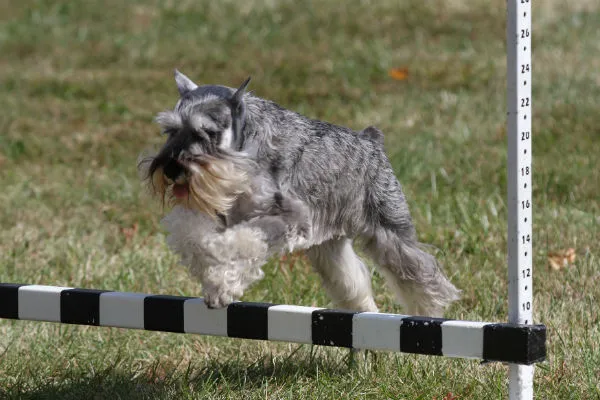 Alert Miniature Schnauzer dog with a distinctive wiry coat, bushy eyebrows, and beard
Alert Miniature Schnauzer dog with a distinctive wiry coat, bushy eyebrows, and beard
The Miniature Schnauzer is a smart, trainable, and cheerful little dog that strongly resembles its Standard Schnauzer cousin. This Terrier breed sheds very little, making it a great option for those seeking a list of small dogs that don’t shed. Their adaptability allows them to feel at home in both city and country settings, as long as their beloved people are close by. To keep Miniature Schnauzers looking their best, weekly brushing and regular professional grooming are essential to manage their wiry coat. While spirited and playful, they are also known for their loyalty and good temperament, capable of being calm and devoted companions indoors when their exercise needs are met. Their intelligence makes them highly trainable, contributing to a well-behaved and peaceful home life.
Poodle (Miniature & Toy)
 Elegant white Poodle with a carefully groomed coat, standing proudly
Elegant white Poodle with a carefully groomed coat, standing proudly
When people think of small dogs that don’t shed, Poodles often come to mind, and for good reason. Miniature and Toy Poodles are non-shedding and hypoallergenic, offering these desirable qualities in intelligent, petite packages. They share the same high intelligence and proud demeanor as their Standard counterparts, differing only in size. All Poodles are highly trainable, active, and enjoy engaging in various activities, yet they are also known for their calm and dignified presence indoors once their mental and physical needs are met. Their curly hair does require regular professional grooming and brushing to prevent mats. Their gentle nature and minimal shedding make them an ideal choice for a calm, non-shedding small dog that is both elegant and brainy.
Scottish Terrier
 Bold Scottish Terrier dog with a wiry black coat and an independent stance
Bold Scottish Terrier dog with a wiry black coat and an independent stance
The Scottish Terrier, affectionately known as a Scottie, is a Terrier breed renowned for its boldness, confidence, and big personality. Their wiry, weather-resistant coat sheds very little, making them a good choice for those concerned about shedding. However, they do require regular brushing, grooming, and occasional hand-stripping to maintain coat health and the breed’s distinct outline. Scotties are clever and independent, often exhibiting a strong prey drive, which means careful management around smaller animals is necessary. While they possess a spirited terrier nature, they are also deeply loyal and affectionate with their families. With proper exercise and mental stimulation, they can be surprisingly calm and dignified companions indoors, enjoying quiet time with their owners.
Shih Tzu
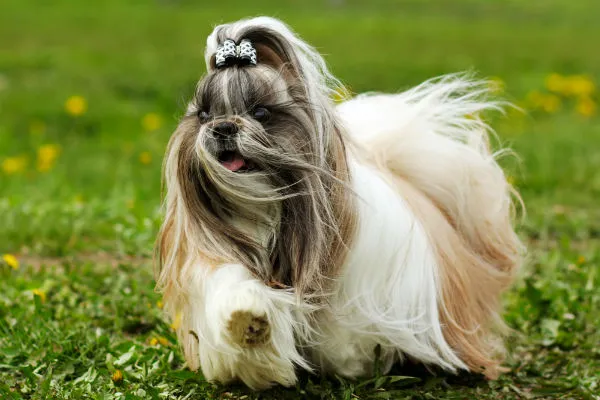 Long-haired Shih Tzu dog with a flowing coat, looking regal and calm
Long-haired Shih Tzu dog with a flowing coat, looking regal and calm
The Shih Tzu is another breed with a long and storied pedigree, historically favored by royalty during the Tang Dynasty. These “little lion dogs” come in a variety of colors and patterns. Their long, silky hair is very low-shedding and looks exceptionally regal when brushed out, befitting their royal ancestry. This Toy breed is sturdy, lively, and often described as having an arrogant carriage due to their proudly held heads and curling tails. However, Shih Tzu were bred specifically to be house pets, and their gentle, trusting, and affectionate nature makes them exceptional companions. They are typically very calm indoors, content to cuddle on laps or follow their owners from room to room, making them a prime example of small dogs that don’t shed and are calm.
West Highland White Terrier
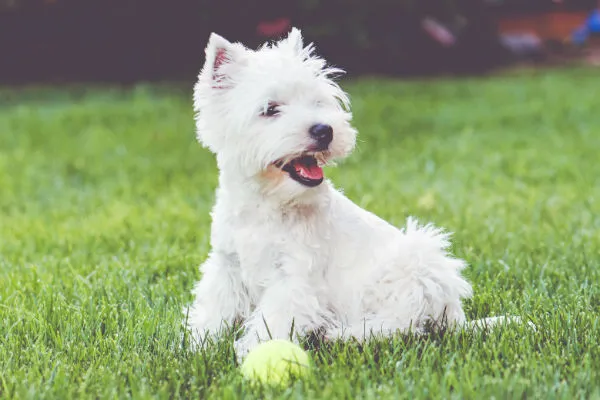 Energetic West Highland White Terrier dog with a white coarse coat and alert expression
Energetic West Highland White Terrier dog with a white coarse coat and alert expression
The coarse, white hair of the West Highland White Terrier, affectionately known as Westies, sheds very little, making them a popular choice for those seeking a low-shedding small dog breed. This sturdy little dog is intelligent, loyal, happy, and highly entertaining. They are curious dogs with moderate energy levels and an independent streak common among all Terriers, which can sometimes make training a delightful challenge. While they enjoy outdoor adventures, Westies are generally calm and content indoors once their daily exercise needs are met. They form strong bonds with their families and are known for their cheerful disposition, making them wonderful, lively yet settled companions for many households.
Xoloitzcuintli
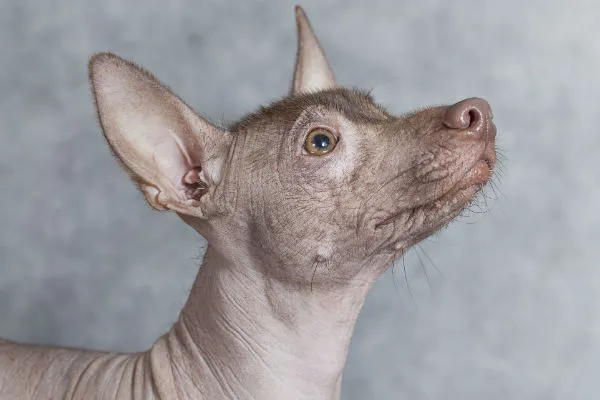 Hairless Xoloitzcuintli dog with smooth, dark skin and alert eyes
Hairless Xoloitzcuintli dog with smooth, dark skin and alert eyes
Also known as the Mexican Hairless, the Xoloitzcuintli is an ancient and rare breed that comes in both hairless and coated varieties. The hairless version retains only a small amount of hair on its head, while the coated variety has a very short, fine coat that sheds minimally. Naturally, the hairless Xolo needs extra attention for its skin, requiring protection from the elements. Xolos are known for their tranquil personality around the home, making them ideal calm, non-shedding small dogs. They are attentive watchdogs and affectionate companions who enjoy physical activities like walks and vigorous play, but equally appreciate quiet time curled up with their family. Their serene nature makes them an excellent choice for a peaceful home environment.
Yorkshire Terrier
 Small Yorkshire Terrier dog with long, silky dark and tan fur, looking spirited
Small Yorkshire Terrier dog with long, silky dark and tan fur, looking spirited
Sprightly, tomboyish, and affectionate, the Yorkshire Terrier, often called a Yorkie, is a Toy breed brimming with personality. These spunky lap dogs are incredibly popular for good reason: they do not shed, and their silky coats are beautiful when brushed out daily. Their small size makes daily grooming quite manageable. Despite their regal carriage, Yorkies have working-class roots, originally hunting rats in English clothing mills. Today, they are just as happy to sit on their owner’s lap as they are to engage in playful antics. Yorkies are devoted to their families and, while spirited, are also known for their affectionate and generally calm demeanor when indoors, making them a fantastic option among small dogs that don’t shed and are calm.
Other Calm, Low-Shedding Terrier Breeds
The Terrier group is a treasure trove of small dogs that don’t shed or shed minimally. Many wiry- and coarse-haired Terriers, like the Border Terrier, offer similar benefits with their low-shedding coats. These breeds often possess spirited personalities but can be incredibly loyal and calm companions when properly exercised and trained.
 Cute Border Terrier dog with a scruffy brown coat and bright eyes
Cute Border Terrier dog with a scruffy brown coat and bright eyes
Conclusion: Finding Your Perfect Peaceful Companion
Selecting a dog is a significant decision, and finding small dogs that don’t shed and are calm can bring immense joy and harmony to your life. While these breeds offer the dual benefits of minimal shedding and a relaxed demeanor, remember that every dog is an individual, and proper training, socialization, and consistent care are key to nurturing their best qualities.
Always take the time to carefully research specific breeds to ensure their temperament, grooming needs, and exercise requirements align perfectly with your lifestyle and personality. To promote health and happiness, always acquire a dog from a reliable breeder or reputable rescue, provide a high-quality diet, and ensure regular veterinary checkups. By making an informed choice, you’ll welcome a loving, calm, and non-shedding companion who will enrich your home for years to come.
